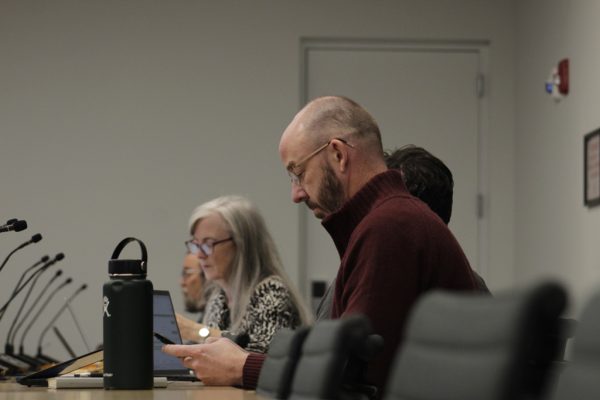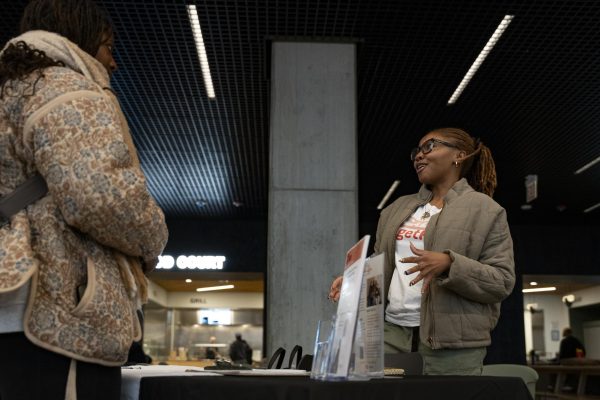Faculty, students, staff speak out against prioritization recommendations
March 2, 2012
In a strongly worded private email to President Warrick L. Carter sent March 4, the tenured members of the Faculty Senate’s Executive Committee accused Louise Love, interim provost and vice president of Academic Affairs of implementing her recommendations for restructuring departments before the faculty has a chance to weigh in on them.
In her recommendations for the proposed Creative Writing Department, Love wrote she intended “to take preliminary steps this spring in the hope that the recommendation will be approved by the president and the Board of Trustees.”
In their email, which was obtained by The Chronicle, the senators warned that even preliminary steps were an expression of “tremendous disrespect” to members of the faculty and the Academic Team charged with evaluating the recommendations before they are submitted to Carter and the Board of Trustees for action.
“If implementation is done prematurely, there is … potential for serious harm to the long-term health of the College,” the email stated.
While the committee cautioned that it was not responding to any specific recommendation, it nonetheless singled out the recent decisions not to renew the contracts of two department heads—Albers and Ken Daley of the English Department—and to grant only a one-year contract renewal to Susan Imus, chair of the Dance/Movement Therapy and Counseling Department, as examples of premature implementation.
The senators invited Carter to respond with a written statement to be read at the next Faculty Senate meeting on March 16.
Attempts to reach Love were not successful. When asked to comment, Faculty Senate President and assistant professor in the English Department Pegeen Reichert Powell had no further response.
Other issues were brought to Love’s attention at the listening forum. Some mentioned in their speeches the rumors circulating about how the college may be preparing to switch to a for-profit platform.
Eric May, associate professor in the Fiction Writing Department and a faculty senator, sent an email to the Faculty Senate March 6, stating that he asked Carter if he plans to take the college for-profit. May quoted Carter in his email, saying: “‘The Board [of Trustees] would never do it. That is not in their thinking.’ He pointed at himself and said, ‘This president would never do it. What’s more, we would lose our accreditation.’”
Students Angered
In the Sept. 29, 2011 issue of The Chronicle, junior humanities, history and social sciences major Joe Hirsch predicted that the prioritization process would create “confusion” and “uncertainty” if it was not addressed with students. As the prioritization process begins to wrap up six months later, Hirsch’s prediction is proving to be true, as some students are angry.
Only moments into Interim Provost and Vice President of Academic Affairs Louise Love’s introduction to her program recommendations at the March 5 listening forum held at Film Row Cinema in the Conaway Center, 1104 S. Wabash Ave., approximately 15 students rose from their seats and erupted into a three-minute statement of protest using the human microphone technique popularized by the Occupy movement.
“The reason we decided to do this wasn’t for the sake of interrupting Louise Love,” Hirsch, one of the protestors, said. “We wanted this to be a manifestation of us forcing [administrators] to listen to us in a real way.”
The students expressed their opposition to Love’s plans for cuts and restructuring, receiving applause and a standing ovation by other students, faculty and staff in the crowd. The protesters noted that the programs facing cutbacks or elimination “define the radical and progressive nature of Columbia” that the college often boasts of to prospective students.
They also said they believe that the recommendations are an attempt to corporatize the college, adding that the administration would not exist without the student body. They also expressed concern that elimination of programs will discredit their degrees.
However, in an interview regarding her recommendations, which were released to the faculty and staff Feb. 28, Love said she did not understand why students would think their degrees would lose credibility.
She said that every college’s curriculum is constantly in transition and noted that students will finish earning their degrees in programs that are eliminated.
“The learning part is going to stay, and the fact that Columbia is an institution that is updating its curriculum should be a strong point for the reputation of the college and our degrees,” Love said. “Students finish whatever program they’re in and benefit because the curriculum will bevery dynamic.”
But Hirsch, whose concentration is cultural studies—which Love recommended be eliminated—said it is less about whether students will be able to receive their degrees and more of how they will be viewed while searching for career opportunities.
“If you have a degree from a program that no longer exists [within your college], an employer is not going to go back and dig deep to find out why your program was discontinued,” he said. “It’s a pretty easy assumption to make.”
Those who protested at the listening forum are not the only students bothered by prioritization. Several fiction writing students picketed outside of the Conaway Center prior to the meeting to show support for Randy Albers, chair of the Fiction Writing Department, whose contract was not renewed as of Feb. 24, as previously reported by The Chronicle on March 5.
Wyl Villacres, senior fiction writing major, said he had not heard about the prioritization process until he read about it in The Chronicle, and the only communication he has received from the administration all semester was an email regarding the tuition hike.
“All we have is rumors and whispers in the wind and anonymous sources telling us stuff off the record,” Villacres said. “We came here because we love the school, we love our programs. We don’t want to see them die. We want to see students who come after us have the same experience as we had.”
Villacres said he hopes there will be a town hall meeting in the future to discuss the tuition increase, faculty and staff cuts and the prioritization process overall.
Danielle Maggio, who graduated from the cultural studies program last December and is now managing editor for Columbia’s cultural studies academic journal “Cultural Landscapes,” said her support is for all programs recommended for elimination.
“Even if we do win this battle of saving cultural studies, we’re very much dedicated to every single program,” Maggio said. “I wouldn’t be happy unless the Center for Black Music Research was saved and the [Institute for the Student of Women and Gender].”






